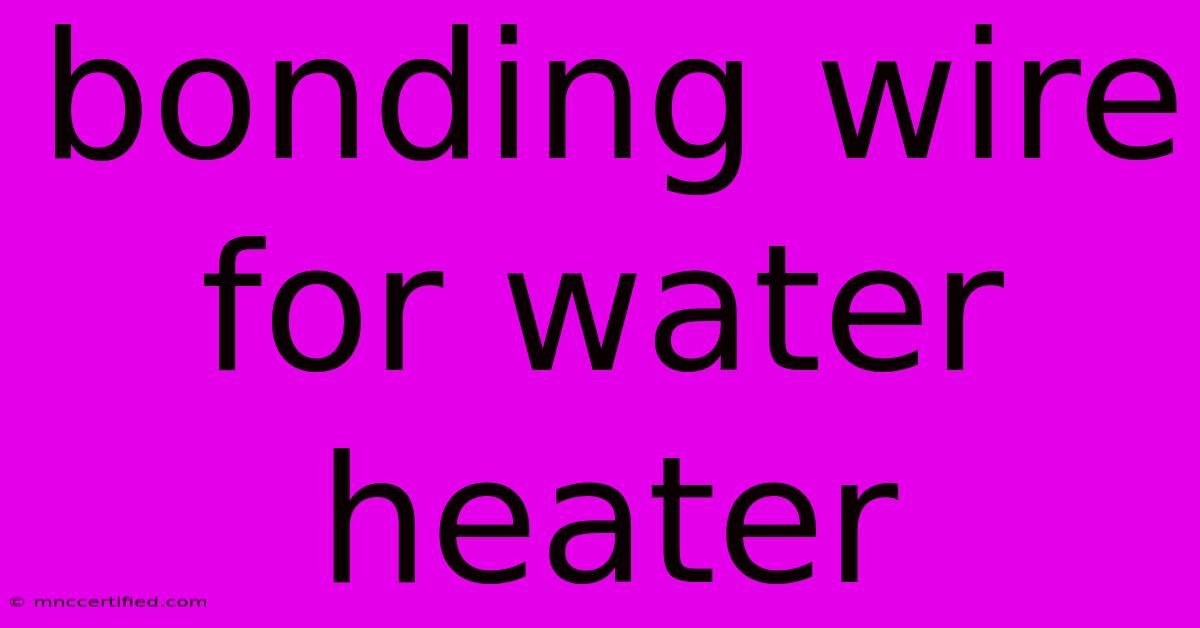Bonding Wire For Water Heater

Table of Contents
Bonding Wire for Water Heaters: Safety, Codes, and Installation
Water heaters, essential appliances in most homes, require specific safety measures to prevent electrical hazards. One crucial aspect often overlooked is bonding wire for water heaters. This seemingly small component plays a vital role in protecting users from electric shock. This article will delve into the importance of bonding wires, relevant building codes, proper installation techniques, and troubleshooting common issues.
Why is Bonding Wire Necessary for Water Heaters?
A water heater's metal tank can become energized due to stray currents or faults within the electrical system. Without proper bonding, this energized tank presents a significant shock hazard. Bonding wire connects the water heater's tank to the grounding system of the house, providing a low-resistance path for stray currents to flow to the ground, thus eliminating the risk of electric shock. This is a crucial safety measure mandated by most electrical codes.
Understanding Grounding vs. Bonding
While often used interchangeably, grounding and bonding serve distinct purposes:
- Grounding: Connects non-current-carrying metal parts of an electrical system to the earth, providing a safe path for fault currents.
- Bonding: Connects non-current-carrying metal parts within an electrical system to each other, ensuring they are at the same electrical potential. In the case of a water heater, bonding connects the tank to the grounding system.
Both grounding and bonding are vital for a safe and compliant electrical system. The bonding wire for the water heater acts as the bridge between the two.
Building Codes and Bonding Wire Requirements
Most jurisdictions adhere to strict electrical codes, including those pertaining to water heater bonding. These codes often specify the type, size, and installation methods for bonding wires. Common codes include the National Electrical Code (NEC) in the US and similar regional standards internationally. Consult your local building codes to determine the specific requirements in your area. Non-compliance can lead to significant fines and safety risks.
Key Considerations from Building Codes:
- Wire Gauge: The code specifies a minimum gauge for the bonding wire, typically copper wire. Using a smaller gauge wire can compromise safety by increasing resistance.
- Connection Methods: Proper and secure connection points are critical. Clamping or using specialized bonding lugs are often required.
- Location: The code dictates where the bonding wire should be connected to both the water heater tank and the grounding system.
Installing Bonding Wire on Your Water Heater: A Step-by-Step Guide
While this guide provides general information, it's crucial to consult a qualified electrician for professional installation. Improper installation can compromise safety.
- Identify the Grounding System: Locate the main grounding electrode system (typically a ground rod).
- Choose the Right Wire: Select a copper bonding wire that meets the requirements of your local electrical code.
- Prepare the Connection Points: Clean and prepare both the water heater tank and the grounding system connection points.
- Attach Bonding Clamps: Securely attach bonding clamps to both the water heater's tank (usually a dedicated point) and the grounding system.
- Connect the Wire: Run the bonding wire between the clamps, ensuring a tight and secure connection at each end.
- Inspect the Connection: Verify that the connection is secure and free of any loose wires or damage.
Troubleshooting Common Bonding Wire Issues
- Loose Connections: Check for loose connections and tighten them securely. A loose connection can lead to a high-resistance path, negating the bonding wire's purpose.
- Corroded Connections: Corrosion can increase resistance. Clean the connection points with a wire brush and apply an anti-corrosion compound.
- Broken Wire: If the wire is broken, replace it immediately with a wire of the correct gauge.
Regular inspection of your water heater's bonding wire is crucial to ensure ongoing safety.
Conclusion: Prioritizing Safety with Proper Bonding
The seemingly insignificant bonding wire for a water heater is a critical component for ensuring electrical safety in your home. Understanding its importance, complying with building codes, and ensuring proper installation are essential for preventing electrical shocks and maintaining a safe living environment. Always consult a qualified electrician for installation, inspection, and any repair work. Your safety shouldn't be compromised.

Thank you for visiting our website wich cover about Bonding Wire For Water Heater. We hope the information provided has been useful to you. Feel free to contact us if you have any questions or need further assistance. See you next time and dont miss to bookmark.
Featured Posts
-
Coote Denies Yellow Card Discussion
Nov 28, 2024
-
South Africa Trails At 79 4
Nov 28, 2024
-
Bonded Teeth Before And After
Nov 28, 2024
-
Update Spotify App For Wrapped
Nov 28, 2024
-
Record Breaking Uk Euro Millions Win 177 M
Nov 28, 2024